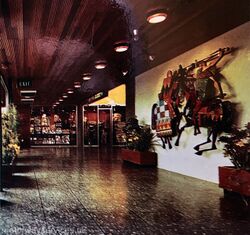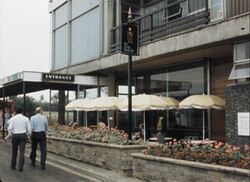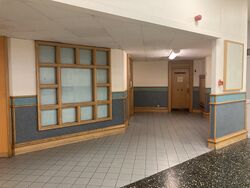History of Trowell services

The services with the Robin Hood theming.

Trowell is one of few service areas which were initially handed to a smaller firm.
Bids to operate the service area opened six months late at the end of 1963. It was described it as a 24 acre site which would require at least £350,000 to be invested in it (around £6million in 2025). Responses were received from Regent Oil, Top Rank and Mecca Leisure.
Rank had proposed a bridge-design with the views looking away from the motorway, but they offered a very low turnover and were rejected.
The building's lease apparently said that it must provide "a waitress service restaurant offering a variable menu for the discerning patron".
Mecca Leisure
Mecca Leisure would later become famous for their local branding, but this wasn't unique to Trowell. They had previously bid for Farthing Corner and Toddington, and would later bid for Hilton Park and Corley. None of those bids were successful, and it's not clear what design they would have used at any of those sites.
At Trowell, Mecca were successful - on condition they agreed to make their restaurant smaller. The site opened on 23 March 1967, with a ceremony attended by the Sheriff of Nottingham and the chairman of Mecca Leisure.
Mecca Leisure were owned by Grand Metropolitan, and their motorway services arm was managed by Michael Guthrie. After Trowell was sold, Mecca Leisure were sold to Rank and Michael Guthrie went on to create Pavilion.
Design
Mecca Leisure insisted that visitors thought of it not as a service area but as a "village". The site was entirely themed around Robin Hood. This was all removed when Granada took over. Much of the specialised stock had caused Mecca Leisure trouble as they were not approved for sale on motorways at the time. 300 staff were employed.
Mecca Leisure, 1967
It was broken into eight blocks of buildings. The northbound side had a small, two-storey building. This was connected by a footbridge to the southbound side which had an area raised above the exit road, while the rest of it was on the ground floor. The main restaurant, on the southbound side, was called The Sheriff's Restaurant, which had 190 seats and was open from 7:30am until 2am. It was a modern restaurant with an elaborate grill section where customers could observe their dish being preparation within minutes, as well as large windows overlooking the traffic.
Two cafés, one in each upstairs area, were called Forest Cafe, each with 150 seats and open until 11pm. Artificial trees were used inside all around, with a real garden outside. There were 100 vending machines in use around the site.
In the entrance hall was a novel '60s feature. It was a large board with a map of the M1 on the left, and a map of the service area on the right. Above this was a grid showing Leeds, Sheffield, Nottingham, Leicester and London. Along the top were the words "sun", "fair" and "rain". A light would then display for each city showing you what the weather was. Next to it was another system of lights, showing you which restaurants were open. It's not clear how long this display was in use for.
The cafés were long rooms with windows all on one side, the other side having the service counter screened by tinted glass. Green trays were used. The main restaurant had a green and red tinted ceiling, red lampshades, Tudor-style oak furniture and a red and green carpet with a leafy pattern. There was a zig-zag shaped counter on which to sit, as well as ordinary tables with place mats.
Mecca called their facilities "an oasis on a concrete strip"; they wanted to be different, but to meet the public's needs. Toilets and a shop were on each ground floor, as well as a children's paddock and pet walk. The forecourt had 30 pumps on each side. A preview day was held for the Trowell Friendship Club.
Egon Ronay, 1977
By the side of both buildings was a large grass area, which has now all been developed over, though a small area remains behind the hotel. An area for dogs was developed in partnership with the RSPCA. Covered and decorated walkways connected the main entrance to what they called the "coach promenade", as well as the main car park on each side. In each lorry park was a small transport café seating 60 people, with four small pyramids on its roof and a corridor leading to the entrance. It was open from 7am until 11pm.
Mecca's architecture did not impress inspectors, who said such a rural location did not deserve such an unsympathetic design. The bright cladding around the forecourt was described as particularly distracting. The southbound upper deck actually extends over the slip roads, to take advantage of the limited space available.
Fuel was available under the brands Regent, Gulf, National, Esso, BP and Shell. Each pump came with its own wing-shaped canopy.
Operation
In 1977 Egon Ronay made a rare positive comment about the services, describing the food as "almost good on occasion". It was the only place which he said was trying to provide a "comfortable, restful, pleasant restaurant", and appreciated the "extensive" menu. The café was not as good was the waitress service, but was still clean with prompt service.
This would be the last service area to have its restaurant buildings almost touching the motorway. While Trowell does have a very small maintenance strip, it's still a maintenance and safety nuisance, and not a view customers particularly appreciate. It was an early candidate for a concrete barrier, which was then extended when the motorway was widened.
The cafés later became known as Marian's Pantry. Mecca trialled a car wash facility in the forecourt, which they called a 'road safety' trial. Their final change was to convert the petrol station to a standard, self-service layout.
Like all service areas, Mecca's grand design and insistence on providing the highest quality meant it was soon struggling financially. In its first year it lost £50,000 (around £750,784 in 2025), and it soon became clear that they wouldn't make back their investment. Unlike rival firms, Mecca Leisure were not willing to cut corners to save cash, so instead they had to sell it.
Their sister company, Midland Catering, examined Trowell but decided not to touch it. Granada agreed to purchase it on 3 September 1977, taking it over in October. The former leader of Mecca's motorway division would later return to the industry by building Pavilion.
The Friar Tuck-In

Perhaps the most unusual concept introduced by Mecca Village was the service station's very own pub: The Friar Tuck-In. It was a large facility positioned by the main entrance, with its own bar and outdoor seating. Its name was a pun on the Robin Hood character Friar Tuck.
The pub's menu was entirely alcohol-free. Mecca Village said it was aimed at families as well as lorry drivers, and was provided in response to a number of drivers bringing their own alcohol from home and consuming it in the parking areas.
The pub would have opened in around 1975.
Changes
In Granada's first few months, they began a process of what they called "modernisation". A new coffee shop was introduced, and the upper level was initially stripped down to provide a more automated experience (with a conveyor belt to place dirty dishes on). This was called Platters, and it closed in winter. The pub was closed, and the car wash removed. The initial feedback was poor; in 1978 Egon Ronay downgraded Trowell from "good" to "poor".
In 1980 the two transport cafés were closed and became offices. They became effectively abandoned, and the northbound one was demolished in around 2002 to make more space for lorry parking. Lorry drivers were instead given a roped off area within the main restaurant.
A Burger Express opened in around 1984. On 7 April 1988 Edwina Currie (MP for South Derbyshire) unveiled a plaque after opening the new Country Kitchen Restaurant upstairs on the southbound side. The new restaurant was described as a trial by Granada, who had spent £750,000 on a new concept (around £2million in 2025), which they said offered more salads and vegetarian dishes. A pot of coffee was 78p (about £2). The restaurant would later be converted into offices.
There was another refurbishment in 1989, where Granada said they were going "upmarket". This included a waitress-service Platters restaurant, and the addition of 'Business Point': an office suite with a secretary, fax machines and Teletext.
Granada proposed adding a Granada Lodge to the northbound side in 1987. They suggested converting the former northbound upstairs restaurant area to bedrooms in 1990, and received permission, but didn't do it. The lodge opened in 1996 as one of the last Granada Lodges; it was built on the grass lawn.
The building was evacuated on 20 June 1989, after a call was made claiming a bomb was on the premises. The threat turned out to be untrue. Service areas are busy transport hubs and had to be on high alert during this difficult period.
Plans were announced in 1989 to widen the M1. This could have had a significant impact on the service area, but when it eventually happened in 2009, no new land was needed. An unusual backlit motorway sign referring to the service area had been attached to the motorway bridge at Waterloo Lane when it was first built; it was now faded and difficult to read, and was finally removed as part of the roadworks. It would have been one of the oldest motorway signs in the country at the time.

On the northbound side, a tourist information centre was opened in a portable building in March 1991. By now the building was painted bright white and red all around. A Burger King was provided in the former Marian's Pantry, on the northbound upstairs landing. The full restaurant remained on the southbound side, though Granada noted very few people were making use of the bridge between them. Part of the car park was leased to a pallet business which traded until 1999.
Until about 1996, the entrance to the toilets was still separate to the entrance to the rest of the building. At this point the two were combined to work with a single entrance. There was still only a small foyer, linking the shop, toilets and stairs. An extension was proposed to house a new game arcade, but this was replaced by a decision to build a Little Chef in 1997. This opened in an extension on the far left of the building, with steps up to it from inside the building.
A new southbound dining area was added to the lower level; that was then extended to provide one of the first mini-shopping malls. Shops included Tandy Express and Sock Shop, Superdrug, Clinton Cards and Thorntons.
By this point most of the greenery around the building had been built on. Parking was charged at a rate of £5 for cars (around £10 in 2025) and £7 (about £14) for HGVs, with a £60 penalty fee (£117).
Granada were given permission to change Trowell's name to "Nottingham" in June 1996. The proposal was abandoned due to the cost and poor reaction, although the new name was used in some of their publicity. By this stage, a cooked breakfast cost £4.99 (worth around £9 in 2025) and a cup of coffee cost £1.79 (now worth about £3).
A large extension to the northbound building opened in 2002. This added a large seating area, with more natural lighting, and allowed Burger King to move to the ground floor. It was accompanied by a second half in 2006, which added a new retail area by the entrance. The Little Chef was later converted to become a large M&S Simply Food. Cladding was placed around the distinctive upstairs restaurant windows, where the offices now are, covering it all up. Which? were very impressed when they visited in 2006, calling it "dull, uninspiring, noisy and gloomy".
On the southbound side more recently, in 2016 the redundant units added to the front of the southbound services were used to create one of few indoor West Cornwall Pasty Company units.
During early 2017, the southbound EDC restaurant was removed to make way for a M&S Simply Food store which opened in February 2017 to join its northbound counterpart.